You are here
Digital Technologies: Software Engineering, Robotics & AI for Health

Illinois Ignite 2020 has ended. However, if you are interested in seeing the recording of a presentation(s), please email Nicole Nair, nnair@illinois.edu

Everyday Coding with Graphical User Interfaces
Ravi Chugh develops programming language technology spanning type systems, synthesis algorithms, and other program analysis techniques for applications in software engineering and human-computer interaction (HCI). The overarching theme of his current research efforts is the development of direct manipulation programming systems that integrate the expressive power of programming languages with the ease-of-use of GUIs. His most recent work in this space is the Bidirectional Evaluation with Direct Manipulation algorithm, which synthesizes program changes based on output changes made by the user. He joined the University of Chicago in 2014 as an Assistant Professor and is a recipient of the National Science Foundation Career Award.

Predicting Neurodegeneration via Machine Learning Models
Ravi Iyer leads the DEPEND Group that develops AI analytics framework which have been deployed in applications with industry, health providers, and government agencies. His research group collaborates with industry partners like IBM, Microsoft, and the Department of Defense. He also led the Trusted Illiac (Illinois Automatic Computer) project. He was the institutional lead and is currently the technical area lead on Illinois’ Blue Waters Petascale project which is funded by a $200M National Science Foundation grant. He is a Fellow of the American Association for the Advancement of Science, the Association for Computing Machinery, and the Institute of Electrical and Electronics Engineers.

DIG-I-PRIME™ to Enhance Stroke Neurorehabilitation
Sangeetha Madhavan directs the Brain Plasticity Laboratory (BPL), which tests and develops state-of-the-art, low-cost, and clinically translatable therapies that enhance the ability of the brain to reorganize to optimize movement recovery in individuals with stroke. Dr. Madhavan has been funded by several national agencies such as the National Institutes of Health (NIH), American Heart Association (AHA), and others. Speaking on the development of a gamified ankle rehabilitation device for stroke patients using priming techniques.

AC-DC: Amplification Curve Diagnostics of COVID-19 via Adaptive Group Testing
Olgica Milenkovic develops new approaches for studying problems in bioinformatics and bioengineering using coding and information theory. In particular, she investigates fundamental questions pertaining to design methodologies for DNA microarrays with error- and quality-control features and DNA microarrays that utilize compressed sensing principles. Her work has received numerous best paper awards as well as wide-spread recognition from media outlets like Scientific American. She served as a guest Editor-in-Chief for a special publication dedicated to interdisciplinary work of V.I. Levenshtein. In 2015, she received a $1.3M Big Data to Knowledge (BD2K) Award from the National Institute of Health. She is a Fellow of the Institute of Electrical and Electronics Engineers (2018).

Into the World of AI Species: Tiny, Low power, and Self-aware Autonomous AI Systems for Everyday Use
Amit Ranjan Trivedi is currently an assistant professor, and has been with the Department of Electrical and Computer Engineering at the University of Illinois at Chicago (UIC), IL since 2015. His current research interests include neuromorphic computing, emerging nanotechnologies, and energy-efficient artificial intelligence (AI) systems. Amit received the IEEE Electron Device Society (EDS) fellowship in 2014 where he was one of the only three recipients worldwide. Amit also received Georgia Tech Sigma Xi's best Ph.D. dissertation award. He has authored or co-authored over 40 papers in refereed journals and conferences. He has been awarded two U.S. patents. Amit's research has been supported by grants from Semiconductor Research Corporation (SRC), Intel, Google, and Illinois Ventures. He is a Member of IEEE.

Human-Compatible Machines Empowered by Advanced Materials and Intelligent Computing
YZ’s research can be summarized in three words: Molecules, Materials, and Machines. Leveraging their expertise in molecular science, soft materials, and modeling, his group advances the development of soft robotics and human-compatible machines, intelligent control algorithms, and understandable artificial intelligence that can lead to immediate societal impact. He has been recognized with several awards including, most recently, the Dean’s Award for Excellence in Research and the American Nuclear Society Landis Award.

Sibel: Better Health Data for All
Steve Xu MD, MSc is currently an Assistant Professor in the Department of Dermatology at Northwestern’s Feinberg School of Medicine. He has developed several medical device technologies across multiple medical fields including dermatology, orthopedics, cardiology and patient non-adherence that have raised competitive funding from government grants and private investors and garnered coverage from Forbes and The Huffington Post. For his academic interests, Dr. Xu focuses on the role of FDA regulation on medical device innovation and the development of policies that facilitate breakthrough innovation in healthcare. His publications have appeared in The New England Journal of Medicine, Drug Discovery Today, Annals of Internal Medicine and Science Translational Medicine garnering press attention from sources such as The New York Times, CNN, The Washington Post, and The Los Angeles Times. Dr. Xu is the founding chair of educational initiatives for Advancing Innovation in Dermatology, a not-for-profit organization catalyzing new product innovation in the field.
Startup: Sibel -- creating soft, flexible sensors for comprehensive vital signs monitoring.

